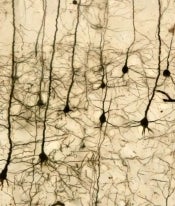New NIH-funded program will train ASU students for the future of AI-powered medicine

PhD student Maitry Trivedi works with Teresa Wu’s team using AI for Alzheimer’s research. Photo illustration by Jeff Newton
The medical sector is increasingly exploring the use of artificial intelligence, or AI, to make health care more affordable and to improve patient outcomes, but new programs are needed to train engineers and biomedical researchers for this future.
A team at Arizona State University has received a $2.35 million award from the National Institutes of Health (NIH) to establish just such a pioneering program to train doctoral students to meet these needs.
The program will welcome its first cohort of PhD students in the spring of 2025.
This new initiative, called Intergenerational Community Driven Training in Alzheimer’s Disease Research: An AI+X Approach, builds on prior successful work by Teresa Wu and Baoxin Li, both professors in the School of Computing and Augmented Intelligence, part of the Ira A. Fulton Schools of Engineering at ASU, to develop AI systems for medical imaging that improve the diagnosis and treatment of Alzheimer's and other neurodegenerative diseases.
AI is perceived as an especially impactful tool for those affected by neurodegenerative diseases since early screening can significantly improve treatment and care options for patients and their families.
“Artificial intelligence will continue to revolutionize health care, changing and improving the way we approach the diagnosis and treatment of many diseases, including Alzheimer's,” Li says. “Successfully preparing researchers for this future is essential.”
Under the new initiative, Wu and Li will join forces with principal investigators Judith Klein-Seetharaman and Ramon Velazquez, researchers in ASU’s Biodesign Institute. Klein-Seetharaman is a leading molecular scientist and professor in ASU's College of Health Solutions and School of Molecular Sciences, while Velazquez is a sought-after expert on the progression of neurodegenerative diseases and an assistant professor in ASU's School of Life Sciences.
Together, the team of researchers will create a curriculum for doctoral students. The new program will combine what students learn in the classroom with what they observe in real-world settings, and then task them with developing new AI tools to help doctors, clinicians and health care workers.
The latest in neuroscience research
The complexity of the human brain allows it to do amazing things, but it also makes it a challenge for medical science to study. Learn more at the Biodesign Institute.
“We are thrilled to bring this opportunity to our doctoral student pool, allowing us to recruit competitive students and immerse them in various training and research activities available at ASU, with the help of our collaborating partners in a necessary area of expertise to improve the lives of those affected with Alzheimer’s disease,” Velazquez says.
Trainees will benefit from the involvement of several local research institutions, including Mayo Clinic, Banner Alzheimer's Institute, Barrow Neurological Institute and Translational Genomics Research Institute (TGen). The program will actively engage the Arizona Alzheimer’s Consortium and the Arizona Alzheimer's Disease Research Center.
One unique aspect of the program is its partnership with Mirabella, a senior living community on the ASU campus, and Hospice of the Valley, Arizona's leading provider of end-of-life care. These collaborations are intended to provide trainees with hands-on experiences that reflect real-life medical challenges and solutions.
As the program prepares to recruit its first cohort, faculty and potential candidates anticipate the transformative impact it will have on the future of Alzheimer’s research.
This initiative not only represents a significant investment in the fight against Alzheimer's disease and related dementias but also highlights ASU’s commitment to innovating through education and collaboration.
More Science and technology

4 ASU researchers named senior members of the National Academy of Inventors
The National Academy of Inventors recently named four Arizona State University researchers as senior members to the prestigious organization.Professor Qiang Chen and associate professors Matthew…

Transforming Arizona’s highways for a smoother drive
Imagine you’re driving down a smooth stretch of road. Your tires have firm traction. There are no potholes you need to swerve to avoid. Your suspension feels responsive. You’re relaxed and focused on…

The Sun Devil who revolutionized kitty litter
If you have a cat, there’s a good chance you’re benefiting from the work of an Arizona State University alumna. In honor of Women's History Month, we're sharing her story.A pioneering chemist…


